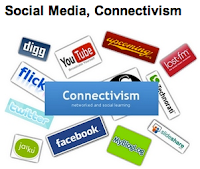It is the end of Week 7 of my Educational Theory class, we are nearing the end of the class. This class has proven to be interesting as well as difficult in there are quite a few different theories on how we, human beings, learn and process information.
This week's learning resources contained suggestions on how to integrate technology into learning based instruction-an important concept for an Instructional Designer to understand. With this week's resources in mind, as well as our analysis of the major learning theories, we were to revisit and reflect upon our initial Week 1 response of "how you learn best"... In that reflection we were to consider the three following questions:
- Now that you have a deeper understanding of the different learning theories and learning styles, how has your view on how you learn changed?
- What have you learned about the various learning theories and learning styles over the past weeks that can further explain your own personal learning preferences?
- What role does technology play in your learning (i.e., as a way to search for information, to record information, to create, etc.)
Question #1:
In my Week 1 Class Discussion I stated "In my assessment, I feel that I learn most productively through conventional and traditional teaching methods. I am an auditory and visual learner, with auditory learning being my preferred method. I am 80% auditory, 15% visual, and 5% kinesthetic. Typically I am able to listen to the relayed information, write the information down, and then simply remember it. On rare occasions is it necessary for me to “do” the action in order to understand the theory of how something works".
I still feel that I learn most productively via conventional and traditional learning methods. I have discovered that I am fairly adaptive and am adjusting non traditional learning such as by utilizing web based applications and forums to increase my knowledge base. I have also discovered that being an auditory, visual, and kinesthetic learner is a "learning style and intelligence strength". When I initially entered this class I had little experience and knowledge in this field of study and had to research or read the blogs of my colleagues to understand what my Professor was "asking". Granted I still lack experience, I have gained knowledge in which I can build upon in the future academically as well as professionally.
I also will admit that learning is much more complicated than I realized as it is an individual process for everyone. Everyone learns differently, and what works for me, may not work for another person. This is something that I will need to learn to address as I begin to design learning applications as an Instructional Designer. The information that I have learned will greatly assist me in that...
Upon further examination I realize that I utilize several of the learning theories that we have studied. I utilize adult learning theories, connectivism, constructivism, social learning, cognitivist theories, and finally behaviorist theories. Initially I felt that cognitivism was the way that I learned. We all adapt as needed on the information, context, and stimulus...
Upon further examination I realize that I utilize several of the learning theories that we have studied. I utilize adult learning theories, connectivism, constructivism, social learning, cognitivist theories, and finally behaviorist theories. Initially I felt that cognitivism was the way that I learned. We all adapt as needed on the information, context, and stimulus...
Question #2:
In my initial assessment during Week 1, I stated that the cognitive theory appeared to best apply for my preferred learning method. I realize now that one learning theory is not necessarily better than the other, but it may be better suited depending on the material, stimuli, and student. For example the behaviorist learning theory may be useful when students need to learn information that depends on rapid recall-such as basic math or learning historical dates. To instill analytical and problem solving skills the cognitive or constructivism theory may be better suited or applied. For a full time professional seeking to further their career by returning to school Connectivism and Adult Learning techniques are better suited. The key of course is knowing when to apply what theory and to what degree.
I am still confused from a neuroscience stand point exactly how my brain stores information. I have discovered however that social learning plays a strong role on how I form my opinions and therefore "learn"...
Question #3:
Technology plays a huge role in education in the 21st Century. With the discovery and development of the Internet and the World Wide Web we are able to learn and communicate from sources outside of our geographical radius-the world is more connected than ever! Research and learning can be done from anywhere there is a Internet connection. Students are no longer limited to the hours of their local library or their professor's office hours.
I enjoy using technology to increase my knowledge and understanding. I utilize RSS Feeds, various Search Engines, Personal Web (websites such as Diigo and LinkedIn, for example), and Blogs to increase my understanding of subject academically, personally, and professionally. Online Social Networking, for example, is an excellent way to communicate with people with like interests.
I was not aware that I was already involved and practicing the learning theory of Connectivism until this course.
My only fear with this influx of data is how to validate the information that I am receiving. Without a SME or a professor as a guide it is easy to get on the wrong track and not develop an accurate understanding....
